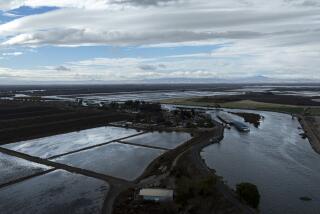Water District Ends Rationing Program; Cities Might Follow : Conservation: Officials leave open the possibility that mandatory cuts might have to be reinstated, especially if the coming summer is hot and dry.
- Share via
LONG BEACH AREA — A major water supplier in Southeast Los Angeles County ended its water rationing program Wednesday, clearing the way for area cities and local water companies to eliminate their mandatory conservation programs.
The Central Basin Municipal Water District, which ended rationing, sells imported water to city water departments, water companies and districts in the Southeast area. Until Wednesday, it required its customers to reduce their purchases by 10% or face penalties.
But Central Basin General Manager Richard W. Atwater cautioned that the rationing program might have to be reinstated.
“If we have a hot, dry summer, it will be more difficult for people to conserve,” Atwater said. “We still are in the sixth year of a drought.”
Three of the district’s customers, Park Water Co., California Water Service Co. and the tiny Bell Gardens municipal water system, quickly followed suit and ended their mandatory conservation programs Wednesday. The two water companies had imposed penalties on residents and businesses that did not reduce their water usage by 10%. Bell Gardens Water Department required 15% conservation, said Steve Steinbrecher, the city’s public works director.
Park Water, which buys about 90% of its water from the Central Basin District, serves portions of Artesia, Bellflower, Bell Gardens, Compton, Lynwood, Norwalk and Santa Fe Springs. California Water Co. buys about 65% of its water from the Central Basin District. It serves Commerce and portions of Montebello. The Bell Gardens water department, which relies entirely on imported water, serves about a fourth of the city.
Officials of the three water systems are still requesting that customers conserve water.
‘We’re still asking our customers to voluntarily conserve 10%,” said California Water General Manager David Diamond.
Rationing programs requiring residents and businesses to conserve from 10% to 30% remained in effect in parts of Bell, Commerce, Huntington Park, Maywood, Montebello, Whittier and La Habra Heights. But water officials in those areas, which rely on imported water in varying degrees, said they would consider eliminating rationing.
The Cerritos City Council was to consider ending its mandatory conservation program Wednesday night, an official said.
The Central Basin Water District followed the lead of the giant Metropolitan Water District, which announced last week that it was ending its rationing program on Wednesday.
The MWD, Southern California’s biggest water supplier, imports water from Northern California and the Colorado River for sale to 27 smaller water agencies, including the Central Basin Water District.
The MWD returned to a voluntary conservation program after determining that recent rains, successful conservation programs and an increased water allocation from the state left the area with sufficient reserves to make it through the year.
The Central Basin Water District resells the MWD water to most municipal water departments and independent water companies in the Southeast area.
The Southeast area relies on the MWD for about 40% of its water. Local water departments and companies meet the rest of the area’s needs by pumping ground water.
The drought hit home last year, when municipal and independent water companies and districts supplying Long Beach and at least 19 cities in the Southeast area imposed mandatory conservation measures.
The cities and water agencies that rely heavily on MWD water generally set up the most stringent conservation programs to avoid fines for using too much imported water. Officials have not imposed conservation limits on ground water, which remains relatively plentiful.
Local water agencies began easing conservation requirements several months ago.
Last October, Lakewood became the first city in the area to repeal its mandatory conservation ordinance after its residents and businesses reduced their water consumption by 28%.
The MWD and the Central Basin Water District were requiring at least a 20% reduction in the use of imported water at the time. But that did not have much impact on Lakewood, which traditionally used imported water to meet only 10% of its water needs.
The big break for local water agencies came in mid-March, when the MWD relaxed its rationing program. The MWD dropped its conservation requirement from a minimum of 20% to 10%.
The water departments in Long Beach and Compton, the two cities in the area that buy water directly from the MWD, quickly ended their mandatory conservation programs.
That same week, the Santa Fe Springs water department ended its mandatory conservation program, as did the Southern California Water Co., which serves parts of Artesia, Hawaiian Gardens, Lakewood, La Mirada, Long Beach, Norwalk, South Gate and Whittier.
The rationing programs have hit the pocketbooks of many area residents and business owners during the past year.
In Long Beach, for example, the city’s water customers paid $4.5 million in penalties for using too much water after the city’s mandatory controls took effect in March, 1991. Long Beach water officials say money from the penalties will be used to help offset losses in revenue due to conservation.
For the most part, the area’s municipal water departments, independent water companies and water districts were able to cut back their use of imported water to avoid penalties from their suppliers.
So far, the Bell Gardens water department is the only municipal water department to be fined--$33,800--for not meeting conservation goals, said Central Basin spokesman Tom Salzano. Steinbrecher, Bell Gardens’ public works director, said the water department’s customers simply did not conserve enough water last summer.
The water department at the county’s Rancho Los Amigos Hospital in Downey was fined $10,125 by the Central Basin District for excess water use, said Salzano.
More fines could follow once the Central Basin District tallies usage for the six-month period that ended March 31, Salzano said.
The MWD did not impose fines on the Long Beach and Compton water departments, which met their conservation goals.
More to Read
Sign up for Essential California
The most important California stories and recommendations in your inbox every morning.
You may occasionally receive promotional content from the Los Angeles Times.













